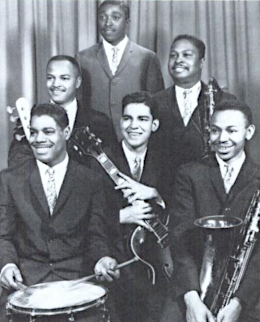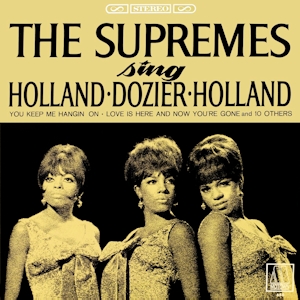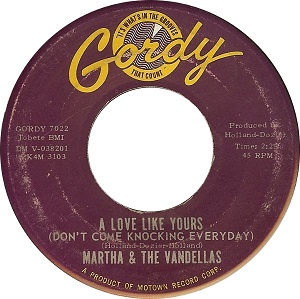
Martha and the Vandellas were an American vocal girl group formed in Detroit in 1957. The group achieved fame in the 1960s with Motown.
Brian Holland is an American songwriter and record producer, best known as a member of Holland–Dozier–Holland, the songwriting and production team that was responsible for much of the Motown sound, and numerous hit records by artists such as Martha and the Vandellas, The Supremes, The Four Tops, and The Isley Brothers. Holland, along with Lamont Dozier, served as the team's musical arranger and producer. He has written or co-written 145 hits in US and 78 in the UK.

Lamont Herbert Dozier was an American singer, songwriter, and record producer from Detroit. He co-wrote and produced 14 US Billboard number-one hits and four number ones in the UK.

The Funk Brothers were a group of Detroit-based session musicians who performed the backing to most Motown recordings from 1959 until the company moved to Los Angeles in 1972.
Holland–Dozier–Holland was a songwriting and production team consisting of Lamont Dozier and brothers Brian and Eddie Holland. The trio wrote, arranged and produced many songs that helped define the Motown sound in the 1960s. During their tenure at Motown Records from 1962 to 1967, Dozier and Brian Holland were the composers and producers for each song, and Eddie Holland wrote the lyrics and arranged the vocals. Their most celebrated productions were singles for the Four Tops and the Supremes, including 10 of the Supremes' 12 US No. 1 singles, including "Baby Love", "Stop! In the Name of Love", and "You Keep Me Hangin' On".

"Nowhere to Run" is a 1965 song by Martha and the Vandellas for the Gordy (Motown) label and is one of the group's signature songs. The song, written and produced by Motown's main production team of Holland–Dozier–Holland, depicts the story of a woman trapped in a bad relationship with a man she cannot help but love.

Marvin Gaye at the Copa is a live album recorded at the exclusive New York club, the Copacabana, where singer Marvin Gaye performed in August 1966, over a year following The Supremes' 1965 performance there. Marvin was only one of just a few R&B musicians after Sam Cooke and Jackie Wilson to perform at the club where performers such as Sammy Davis, Jr., Nat King Cole and Frank Sinatra had performed at regularly. Marvin was the next act from Berry Gordy's fabled Motown label after the Supremes to perform at the nightclub and would be followed by The Temptations in 1968 and Martha and the Vandellas that same year. According to the liner notes later on, Marvin's performance there was a success, however, an ongoing feud between Gaye and his brother-in-law, Motown recording boss Gordy, was said to have been one of the reasons why the album was eventually shelved with the duo fighting over how the album was to be produced. The album had been scheduled for release in January 1967 as Tamla 273 before its permanent shelving. In 2005, Hip-O Select Records, a Motown-associated label created to re-release or release unreleased material from Motown's vaults re-mastered sessions from this album and released it that year.

The Supremes Sing Holland–Dozier–Holland is the tenth studio album released by The Supremes for Motown in 1967. It includes the number-one hit singles "You Keep Me Hangin' On" and "Love Is Here and Now You're Gone". As the title states: all songs on the album were written and produced by Motown's main songwriting team of Holland–Dozier–Holland. Most of the album was recorded during the spring and summer of 1966; however several songs date back to the summer of 1964.

"Heat Wave" is a 1963 song written by the Holland–Dozier–Holland songwriting team. It was first made popular by the Motown vocal group Martha and the Vandellas. Released as a 45 rpm single on July 9, 1963, on the Motown subsidiary Gordy label, it hit number one on the Billboard Hot R&B chart—where it stayed for four weeks—and peaking at number 4 on the Billboard Hot 100.
"Quicksand" is a song recorded by the Motown girl group Martha and the Vandellas. It was written by the songwriting team of Holland-Dozier-Holland and released as a single in November 1963.
"Come and Get These Memories" is an R&B song by Motown girl group Martha and the Vandellas. Their second single released under Motown's Gordy Records subsidiary, "Memories" became the group's first hit single, reaching number 29 on the Billboard Pop Singles Chart, and number-six on the Billboard R&B Singles Chart.
"Live Wire" is a 1964 dance single released by Motown girl group Martha and the Vandellas.
"In My Lonely Room" is a 1964 single by Motown girl group Martha and the Vandellas. In this song, which registered at #6 R&B (Cashbox) and #44 Pop, the narrator solemnly discusses how her lover's flirting with other girls leave her so depressed that all she can do was sit by "(her) lonely room and cry". The song was produced under a more solemn though still uptempo gospel-influenced number that had been on a number of the group's hits starting with "(Love Is Like a) Heat Wave". It was their fifth hit with Holland–Dozier–Holland.

"Jimmy Mack" is a pop/soul song that in 1967 became a hit single by Martha and the Vandellas for Motown's Gordy imprint. Written and produced by Motown's main creative team, Holland–Dozier–Holland, "Jimmy Mack" was the final Top 10 pop hit for the Vandellas in the United States, peaking at No.10 on the Billboard Hot 100 in 1967 and at No.1 on the Billboard R&B Singles chart. Billboard named the song No.82 on their list of 100 Greatest Girl Group Songs of All Time.
"Love (Makes Me Do Foolish Things)" is a 1965 pop ballad by Motown girl group Martha and the Vandellas. A rare ballad for the group, whose forte was reportedly uptempo soul dance numbers including "Dancing in the Street" and "Nowhere to Run", the b-side to the group's single, "You've Been in Love Too Long", although the song only peaked at #70 on the Billboard Hot 100 singles chart and #22 on the Billboard Hot R&B singles chart. Cash Box described it as a "plaintive, slow-shufflin’ heart-throbber with a nostalgic years-back sound."

"A Love Like Yours (Don't Come Knocking Everyday)" is a 1963 song issued as the B-side to Motown singing group Martha and the Vandellas' hit single, "Heat Wave", released on the Gordy label.

"When the Lovelight Starts Shining Through His Eyes" is a song written by Holland–Dozier–Holland and recorded in 1963 by Motown singing group The Supremes. It is notable as the Supremes' first Billboard Hot 100 Top 40 recording, following seven previous singles between January 1961 and September 1963 which failed to enter the Top 40. The single is also notable as the first Supremes single written and produced by Holland–Dozier–Holland, who had previously created hits for Martha and the Vandellas and Mary Wells.
"Mickey's Monkey" is a 1963 song recorded by the R&B group the Miracles on Motown Records' Tamla label. It was written and produced by Motown's main songwriting team of Brian Holland, Lamont Dozier, and Eddie Holland, who later went on to write two more Miracles hit singles, the Top 40 "I Gotta Dance to Keep From Crying", and the Top 20 "(Come 'Round Here) I'm The One You Need". This was an unusual writing situation for the Miracles, as most of their songs were composed by the group members themselves.
"A Tear from a Woman’s Eye" is a 1964 song written and produced by Motown's main production team Holland–Dozier–Holland, and recorded by The Temptations for the Gordy (Motown) label. It competed with several songs, including "The Way You Do the Things You Do" and "Just Let Me Know" in an effort to become the A-side to the group's seventh single. It was recorded just three days before the hit song that it lost the nomination to, which was "The Way You Do the Things You Do". The group's falsetto Eddie Kendricks as the song's narrator, compares several sad situations to a woman crying, which he says is "the saddest thing I've ever seen." This would be the first of only two times in which H-D-H would produce any material for the group, who would be one of the few major Motown acts never to release a single produced by the trio, due to Berry Gordy, Jr., Smokey Robinson, and (later) Norman Whitfield having a tight hold on the group's released material. This song would go unreleased until the 1994 box-set "Emperors of Soul", while "Just One Last Look" would be released as album filler on "The Temptations with a Lot o' Soul". The group would also later cover The Vandellas' "I'm Ready for Love", which would be released on "The Temptations in a Mellow Mood" but not produced by H-D-H.
"Too Hurt to Cry, Too Much in Love to Say Goodbye" is a 1963 song and single written and composed by Motown's main production team Holland–Dozier–Holland. Credited to the Darnells, the performers on both sides of the single were the Andantes, Holland–Dozier–Holland, Mary Wilson of the Supremes (B-side), and members of the Marvelettes, the Four Tops, and the Temptations. Nobody involved with the production on either side was pleased with the false credit. The single peaked at number 17 on the Billboard Bubbling Under Hot 100 chart.









